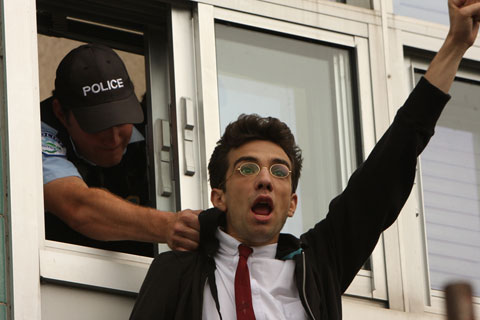
THE TROTSKY Jay Baruchel in the title role proves an inspiring and very funny leader. |
The challenge of being true to oneself while trying to conform with everyone else is a universal movie theme. In this year's Boston Jewish Film Festival, that theme resonates with particular poignance. What could be more central to Jewish experience than stories about assimilation, identity, and solidarity?
But not, one might think, baseball. Peter Miller's JEWS AND BASEBALL: AN AMERICAN LOVE STORY (2010; Coolidge Corner: November 7 @ 4:30 pm) starts with a gag from Airplane! that involves a pamphlet-sized volume of Famous Jewish Sports Legends. Miller maintains that light-hearted tone throughout the film even as he refutes the joke's assumption. Who knew that the first hero of the first ever baseball league (established in 1871) was a Jew? Lipman Emanuel "Lip" Pike led the National Association in home runs for three years, hitting six in his best season. Pike was just one in a line of champions that includes Hank Greenberg, Al Rosen, Sandy Koufax, Shawn Green, and Boston's own Kevin Youkilis. Miller relates their stories with a lucid, Ken Burns–like mix of talking heads (ranging from Koufax to Bud Selig to Larry King) and archival footage as he makes the case that baseball helped Jews assimilate and that Jews, in turn, helped make baseball the all-American game.
Sport gives way to tragedy in the films set during World War II, though they focus less on the Holocaust and more on the heroism, heartbreak, and ingenuity of those who escaped. In Franck Phélizon's LOUISE'S DIARY: 1942 (2010; Coolidge Corner: November 11 @ 9:15 pm), Sarah has changed her name to Louise, and with the help of Huguette, a cabaret singer, and Hans, an SS officer with a heart of gold, she passes for a non-Jew in Nazi-occupied Paris. In short, Sarah must deny her identity in order to survive and take assimilation to the extreme, even to the extent of falling in love with Hans. This does not sit well with her fellow refugee, 16-year-old Robert, who has a crush on her. Based on a true story, Diary touches on some provocative topics. Too bad Phélizon's direction is too clumsy to fulfill its potential.
More accomplished is Fabrice Genestal's HIDDEN CHILDREN (2008; MFA: November 7 @ 4:15 pm), another adaptation of a true story, one in which good intentions go horribly wrong. In 1942, two Jewish toddlers, the brothers Robert and Gérald Finaly, were rescued from the Nazis by a Catholic underground network and given refuge in the home of Antoinette Brun, a scrupulous believer. After the war, Brun was supposed to give the children up to their aunt in Israel. But whatever motivated her risking death to save Jews during the war, it did nothing to cure her own anti-Semitism. Rather than give the boys back to their family, she employs her Resistance tactics in hiding them, this time not from the Nazis but from their own people. Since the boys have been baptized, the Church gets involved, and Genestal's brisk if distanced narrative underscores the ironies of this wrongheaded exercise in righteousness.